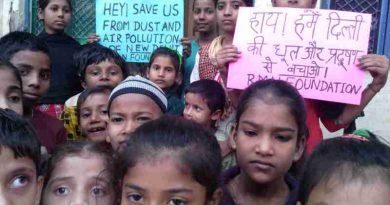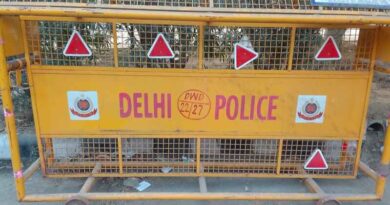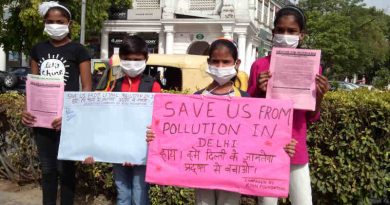Dust Pollution: Your Children Are Not Safe in Delhi
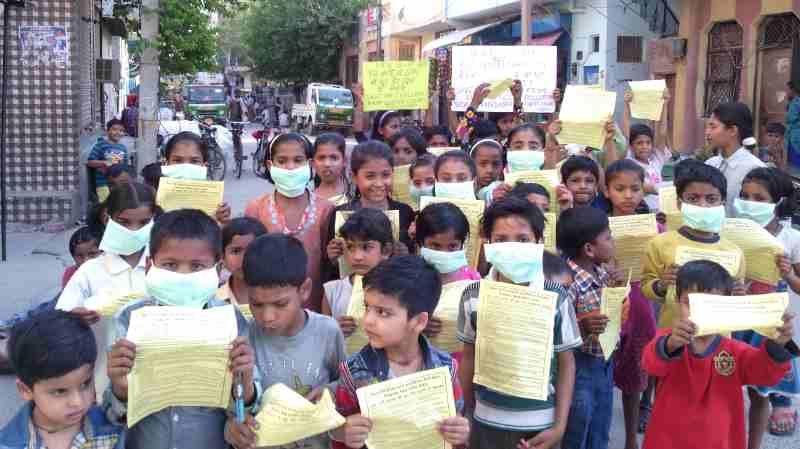
It is estimated that the increasing construction dust will directly attack the lungs of more than 6 million children in Delhi and they will not be able to breathe properly throughout their lives.
By Rakesh Raman
While Delhi is already the world’s most polluted city, it is now facing a new threat from dust and noise pollution as the group housing societies are misusing a vague government policy under floor area ratio (FAR) rules that obliquely allows expansion of occupied houses.
Although people of all ages and orientations will get affected, the pollution from the extended construction activity will dangerously harm children in the entire city of Delhi.
It is estimated that the increasing construction dust will directly attack the lungs of more than 6 million children in Delhi and they will not be able to breathe properly throughout their lives.
As construction dust includes cement particles, it is more harmful than ordinary dust in the atmosphere. If construction activity is carried out in localities where children live, it will cause serious, incurable diseases among them. The diseases include irritation in eyes, skin rashes, coughing, sneezing, hayfever, asthma attacks, and amnesia.
[ Also Read: Save the Senior Citizens of Dwarka from Lethal Dust Pollution ]
Millions of parents in Delhi are worried about the health of their children, but the government is unmoved. Despite numerous representations from the affected people to stop the extended construction activity in group housing societies, the government has not taken any step to save them from construction-related dust and noise pollution.
Abuse of Human Rights
However, in order to combat this menace, a few days ago, an awareness campaign was launched in Dwarka – which is supposed to be the largest residential area in India’s capital New Delhi. The campaign highlights the risks of extended construction in the inhabited group housing societies.
[ Delhi Residents Unite to Stop Construction and Pollution in Dwarka ]
Hundreds of people in Dwarka have come forward to support this environmental-protection movement. They argue that the permission to allow additional construction in group housing societies is illegal because it violates the fundamental rights guaranteed to the citizens in the Constitution of India.
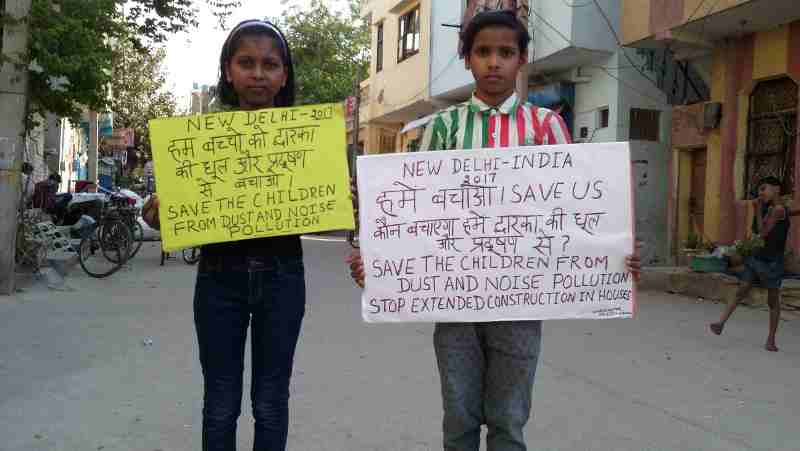
The Article 21 of Indian Constitution assures the citizens of India the right to a healthy, pollution-free environment – which is also a basic human right. If the avoidable construction is carried out in the group housing complexes where people – men, women, and children – are already living, it will deprive them of their right to live in a clean environment.
The National Green Tribunal (NGT) of India – established under India’s constitutional provision of Article 21 – has also observed that one of the major sources of air pollution is dust emission from construction activities, which must be stopped to avoid pollution-related diseases and deaths.
[ एमसीडी चुनाव: क्या आप भी हैं दिल्ली के विनाशकारी नेताओं से परेशान? ]
Even if one person in a particular housing complex opposes construction, he / she wants their fundamental human right to pollution-free environment protected. So, such construction cannot be carried out in that locality.
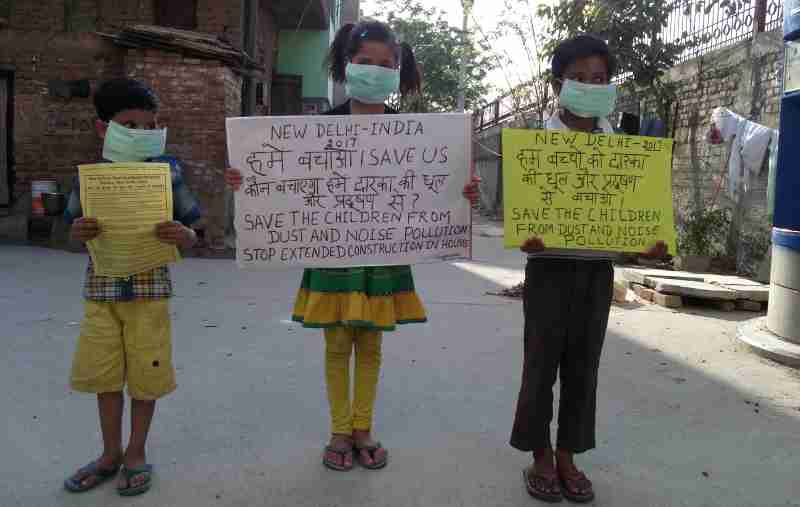
Moreover, no activity can be legal if it poses a risk to even one person’s life. The truth is that the extended construction-related pollution will put to risk the lives of hundreds of thousands of people living in a locality. Thus, extended construction – which is driven by greed, and not by need – is an illegal activity.
Plus, the government’s oblique permission to allow extended construction in the existing upmarket flats is not addressing any housing needs in the country where millions of people are still homeless.
Construction and Corruption
Then why is the Indian government watching quietly when millions of people in Delhi are facing a silent death? Answer: Corruption.
The sudden surge in extended construction activity – which also includes redevelopment of housing complexes – is driven by a criminal nexus between builders and corrupt Indian politicians.
As the managing committees (MCs) of the housing societies – which are governed by the Registrar Cooperative Societies (RCS) of the Delhi Government – are mostly corrupt, they are threatening the residents to accept extended construction.
The police and law-enforcement agencies are reluctant to take action against the MCs of housing societies because they are supported by deep-pocketed builders and corrupt Indian bureaucrats and politicians.
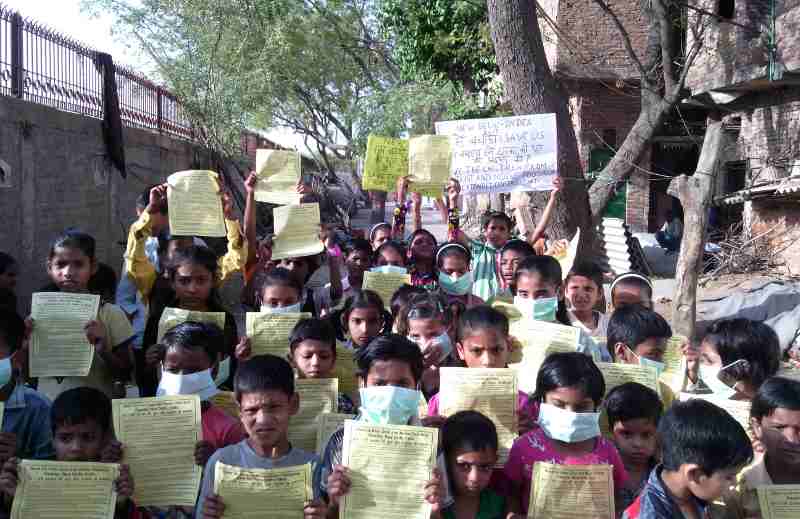
Estimates suggest that the extended construction and building redevelopment projects in Dwarka alone are worth more than $4 billion (Rs. 25,000 crore approximately). The value of such projects in the city of Delhi is estimated to be around $50 billion while the construction activity will run for at least five more years – till 2022.
You can download the pollution-related pamphlet which is being distributed in Delhi as part of the awareness campaign.
The builders and MCs of housing societies need various government permissions before starting the extended construction activity. They will obviously bribe the government officials to get clearances illegally and start construction.
A huge part of this corruption money is expected to go to Indian politicians who are allowing this illegal activity to happen while depriving citizens of their rights guaranteed in the Constitution of India.
As most politicians in India are history-sheeters with serious criminal records, they use the corruption money to win elections by bribing the voters and tampering with electronic voting machines (EVMs).
With such an utter disregard to the environment protection needs, the Government of India is breaking its own commitment to the global community. As India is already experiencing a trust deficit in the global arena because of its weak environmental protection policies, the country’s position will further get damaged if the government allowed the pollution-filled extended construction activity to continue in Delhi.
If nothing else, the government bosses must protect millions of children in Delhi who are being forced to inhale poisonous dust that is coming from the extended construction activity. While the government’s corrective action is awaited, let us say “no” to extended construction in group housing societies.
By Rakesh Raman, who is a government’s National award-winning journalist and runs free school for deserving children under his NGO – RMN Foundation.

![Children demonstrating in the streets of New Delhi so that the Indian government should protect them from dust pollution, noise pollution, and air pollution of extended FAR construction activity in occupied housing societies. Photo and Campaign by Rakesh Raman [ Click the photo to know the details. ]](https://www.ramanmedianetwork.com/wp-content/uploads/2017/04/dwkpol1-800x445.jpg)
